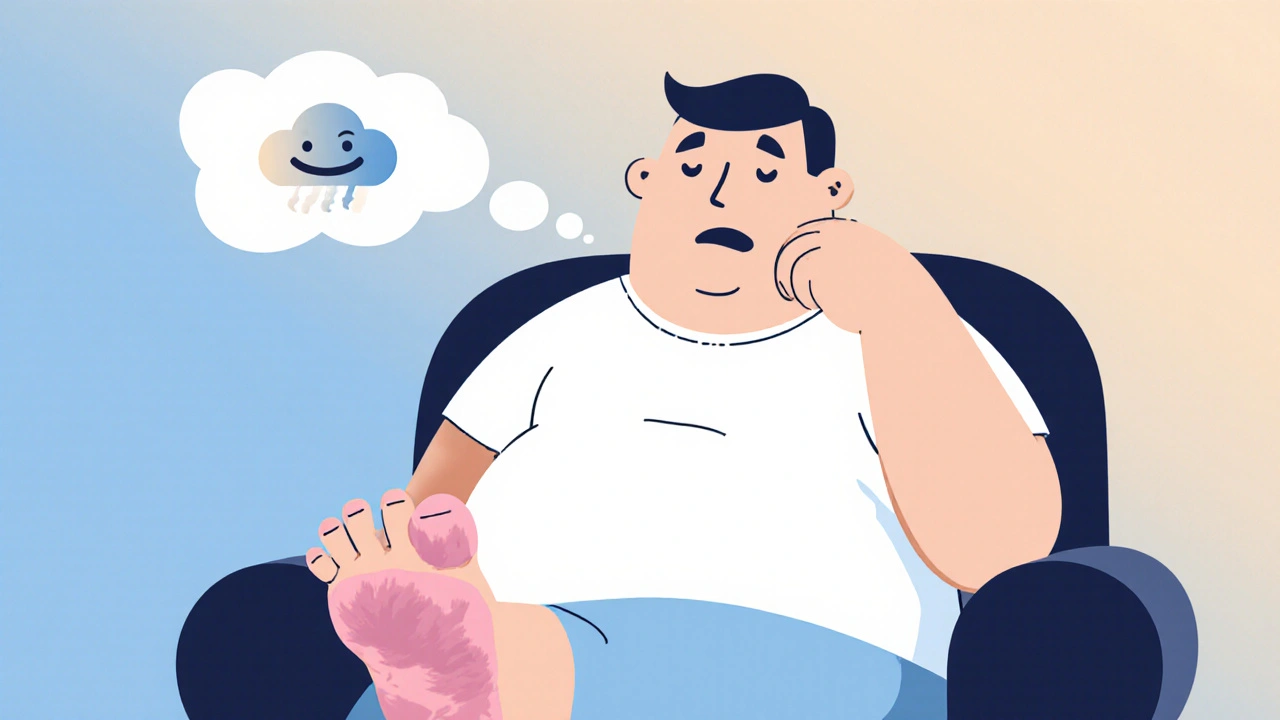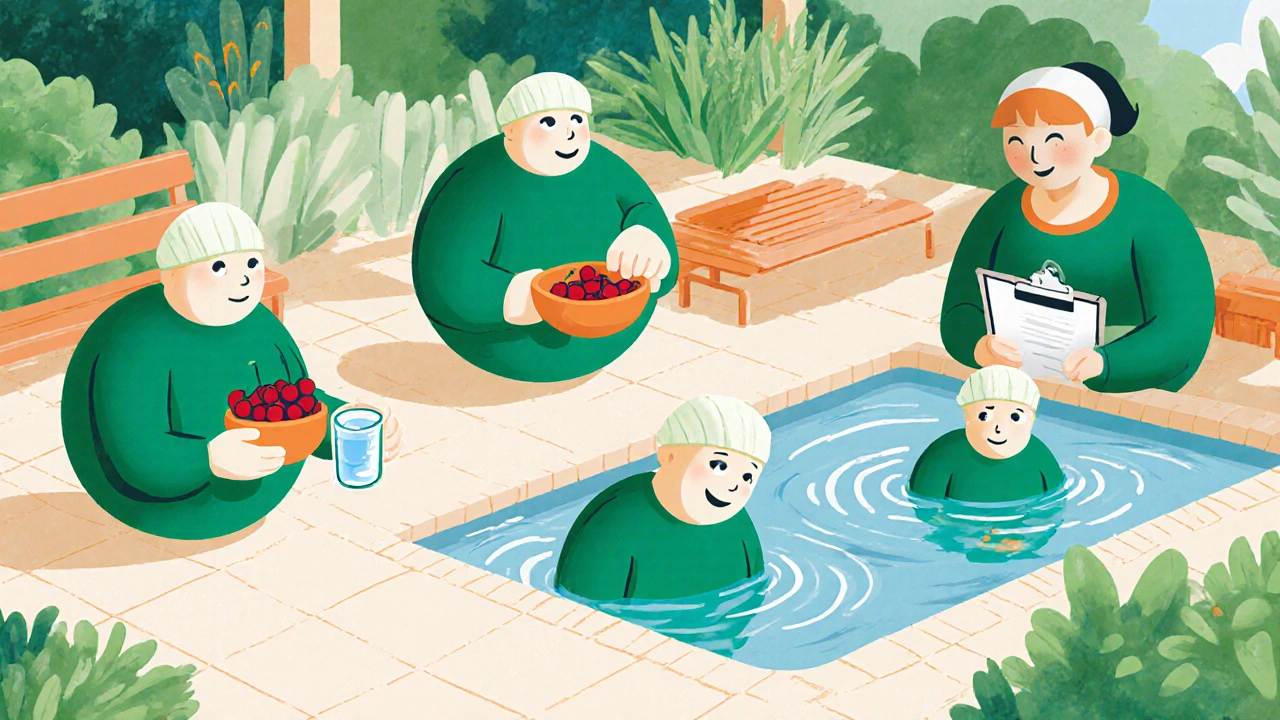How Gout Affects Your Mental Health: Risks, Signs, and Coping Strategies
 Oct, 22 2025
Oct, 22 2025
Gout Mental Health Risk Checker
Mental Health Assessment
Answer these 8 questions about how you've been feeling. This tool helps you identify potential mental health risks associated with gout.
Results
Your Risk Score
0(0-8 points)
Important Notes
- Score 0-4: Low risk
- Score 5-7: Moderate risk
- Score 8: High risk - seek immediate help
This tool is for informational purposes only. It is not a substitute for professional medical or mental health evaluation.
For more information on managing gout and mental health:
- Keep a flare-and-mood diary
- Limit alcohol to 1 drink per week
- Drink 2-3L of water daily
- Seek support from a therapist
Key Takeaways
- Gout doubles the risk of depression and significantly raises anxiety levels.
- Frequent flares, constant pain, and medication side‑effects fuel emotional distress.
- Early screening for mood changes can prevent long‑term mental‑health complications.
- Lifestyle tweaks that lower uric‑acid levels also improve mood and sleep.
- Professional help - from rheumatologists to therapists - is essential when symptoms linger.
Did you know that about gout affects roughly 4 % of adults in the United States and that sufferers are up to twice as likely to experience depression? Those numbers sound alarming, but they also point to a clear link between a painful joint condition and the way we think and feel. Below we unpack why gout isn’t just a foot‑or‑toe problem, how it can steer your mental state off course, and what you can do right now to protect both body and mind.
Gout is a form of inflammatory arthritis triggered by excess uric acid that crystallises in joints, causing sudden, intense pain and swelling. The most common site is the big toe, but the condition can flare in the ankle, knee, wrist, or even the ear. When a gout attack hits, the pain can feel like a hot, throbbing fire, often waking you up at night and keeping you immobile for days.
Mental health refers to the emotional, psychological, and social well‑being that influences how we think, feel and act. Good mental health helps us cope with stress, relate to others, and make decisions. When chronic illnesses like gout enter the picture, the balance can tip quickly.
Why Gout Messes with Your Mood
Three main mechanisms push gout patients toward anxiety or depression:
- Physical discomfort: Persistent joint pain triggers the body’s stress response, releasing cortisol and other hormones that can lower serotonin levels.
- Medication side‑effects: Common drugs such as colchicine or high‑dose NSAIDs may cause gastrointestinal upset, fatigue, or even mood swings, adding another layer of distress.
- Social and functional limits: Missing work, avoiding social gatherings, or needing assistance for daily tasks can foster feelings of isolation and helplessness.
Research from the Journal of Rheumatology (2023) found that people with gout report an average PHQ‑9 depression score 2.3 points higher than age‑matched controls. That’s a clinically meaningful gap, indicating genuine risk rather than a fleeting “bad day.”
Spotting the Warning Signs
Because gout attacks can be unpredictable, it’s easy to miss the gradual mental‑health slide. Keep an eye out for these red flags:
- Persistent sadness or loss of interest in hobbies that used to bring joy.
- Racing thoughts, irritability, or constant worry about the next flare.
- Changes in sleep - either insomnia after a night‑time attack or excessive sleeping to escape pain.
- Appetite shifts, especially cravings for sugary or alcoholic drinks that raise uric‑acid levels.
- Feeling “numb” to pain, which may signal emotional burnout.
If two or more of these symptoms linger for more than two weeks, it’s time to bring a mental‑health professional into the conversation.
How Uric Acid, Lifestyle, and Stress Interact
Uric acid is a waste product formed from purine metabolism that, when elevated, can crystallise in joints and cause gout. High uric‑acid levels are also linked to metabolic syndrome, which is itself a risk factor for depression.
Stressful situations raise cortisol, which can temporarily increase uric‑acid production. That creates a vicious loop: stress → higher uric acid → gout flare → more stress. Breaking the cycle often starts with simple lifestyle tweaks.
- Hydration: Drinking at least 2‑3 L of water daily helps flush uric acid through the kidneys.
- Dietary changes: Cut back on red meat, organ meats, and sugary beverages; favour cherries, berries, and low‑fat dairy.
- Weight management: Even a 5 % reduction in body weight can lower uric‑acid levels by up to 15 %.
- Regular movement: Low‑impact activities like swimming or cycling improve joint flexibility without triggering flares.
These habits not only keep gout at bay but also boost endorphin release, helping to lift mood naturally.
Medical Options That Support Both Joints and Mood
When lifestyle alone isn’t enough, medications step in. Here are the most common options and how they touch mental health:
| Medication | Primary Use | Potential Mood Impact |
|---|---|---|
| Allopurinol - Xanthine oxidase inhibitor that reduces uric‑acid production | Long‑term uric‑acid control | Generally neutral; rare cases of depressive symptoms reported |
| Colchicine - Anti‑inflammatory that curtails crystal‑induced inflammation | Acute flare management | Gastrointestinal upset can elevate stress; short‑term use limits impact |
| NSAIDs - Non‑steroidal anti‑inflammatory drugs for pain relief | Pain control during attacks | Potential sleep disturbances, which may worsen mood |
| Corticosteroids - Potent anti‑inflammatory for severe flares | Severe / refractory cases | Higher doses linked to anxiety, irritability, and mood swings |
Talk with your rheumatologist about any new emotional changes after starting a drug. Adjusting dose or switching meds can often smooth out side‑effects.

Therapeutic Approaches for the Mind
Psychological support isn’t a luxury-it’s part of comprehensive gout care. Here are proven strategies:
- Cognitive‑behavioural therapy (CBT): Helps reframe pain‑related thoughts and reduces catastrophising.
- Mindfulness‑based stress reduction (MBSR): Regular meditation lowers cortisol, which in turn can temper uric‑acid spikes.
- Support groups: Connecting with other gout sufferers normalises the experience and shares practical tips.
- Medication for mood: When depression or anxiety reaches moderate‑to‑severe levels, antidepressants or anxiolytics may be indicated-always under a psychiatrist’s guidance.
Combining any of these with your gout treatment plan usually yields the best outcomes. The goal is to keep you moving, sleeping, and socialising rather than watching pain dominate every day.
Practical Checklist: Managing Gout & Mental Health Together
- Schedule a mental‑health screening at least once a year with your primary‑care doctor.
- Keep a flare‑and‑mood diary: note pain intensity, triggers, sleep quality, and mood rating each day.
- Aim for 8 hours of sleep; use a cool bedroom, limit caffeine after noon, and treat night‑time pain promptly.
- Limit alcohol to one standard drink per week; red wine and beer are especially risky for uric‑acid spikes.
- Set realistic activity goals: 15‑minute walks after meals gradually build endurance without over‑loading joints.
- Ask your doctor about prophylactic Allopurinol if you have >2 flares per year.
- Reach out for counseling if you notice persistent sadness, anxiety, or thoughts of self‑harm.
When to Seek Professional Help
It’s easy to dismiss mood shifts as “just part of the pain.” But consider these thresholds:
- PHQ‑9 score ≥10 (moderate depression) or GAD‑7 ≥8 (moderate anxiety).
- Missed work or social events for more than two consecutive weeks.
- Suicidal thoughts, even fleeting ones-call emergency services immediately.
Your rheumatologist, primary‑care physician, or a licensed therapist can create a coordinated plan. Integrated care reduces the risk of chronic depression, which otherwise can increase cardiovascular disease-a known comorbidity of gout.
Looking Ahead: Research Trends
Emerging studies are exploring how uric‑acid‑lowering drugs might directly affect brain chemistry. Early animal models suggest that reducing uric acid could improve neuro‑inflammation markers, potentially lowering depression rates. While human trials are still in Phase II, the idea reinforces the need to treat gout aggressively-not just to protect joints, but also to safeguard mental well‑being.
Take the First Step Today
Start small: write down today’s pain level on a 0‑10 scale, then note your mood on a simple smiley‑face chart. If the numbers differ dramatically from your usual baseline, you’ve got actionable data to share with your doctor. Remember, tackling gout and its mental‑health impact is a marathon, not a sprint. Consistent, evidence‑based habits will keep you feeling steadier on both fronts.

Can gout cause depression?
Yes. Studies show gout patients have roughly twice the risk of clinical depression compared to the general population, mainly due to chronic pain, flare anxiety, and lifestyle limitations.
What are the early signs of anxiety in gout sufferers?
Early anxiety often appears as constant worry about the next attack, trouble sleeping, irritability, and physical tension such as a tight chest or stomach.
Do gout medications affect mood?
Some drugs, especially high‑dose corticosteroids and NSAIDs, can disrupt sleep or cause stomach upset, which may worsen mood. Most uric‑acid‑lowering meds like allopurinol have minimal direct mood effects.
How can diet help both gout and mental health?
A diet rich in low‑purine foods, cherries, berries, and omega‑3 fatty acids reduces uric‑acid spikes and provides antioxidants that support brain health, helping to lift mood and lower inflammation.
When should I see a therapist for gout‑related stress?
If you notice persistent sadness, anxiety that interferes with daily life, or sleep problems lasting more than two weeks, a mental‑health professional can provide coping tools and, if needed, medication.
Diane Thurman
October 22, 2025 AT 21:13Your post sounds like a pseudo‑science sermon, and it’s full of half‑baked adivce.
WILLIS jotrin
October 24, 2025 AT 01:00Reading through the piece reminds me how intertwined our bodies and minds truly are.
When the joints flare up, cortisol spikes, and that cascade can dim the brain’s serotonin pathways.
Even the smallest lifestyle tweak, like sipping more water, can act as a gentle reset button for both uric acid and mood.
It’s striking that the research points to a measurable rise in PHQ‑9 scores among gout sufferers – numbers don’t lie.
Yet, we often forget that social isolation compounds the biochemical stress, turning a physical ailment into a mental burden.
Mindfulness practices, for instance, have been shown to lower cortisol, which in turn may blunt those uric‑acid spikes.
Conversely, the anxiety of fearing the next flare can become a self‑fulfilling prophecy, triggering more inflammation.
That feedback loop is why a multidisciplinary approach, involving both rheumatologists and mental‑health professionals, feels essential.
From a philosophical standpoint, enduring pain can also reshape one’s worldview, sometimes for the worse if left unchecked.
But there’s also a narrative of resilience, where confronting chronic discomfort spurs deeper self‑awareness.
Practically, keeping a daily diary of pain intensity and mood can illuminate patterns that are otherwise invisible.
When you pair that data with a balanced diet-think cherries, berries, and low‑fat dairy-you’re attacking the problem on multiple fronts.
Exercise, even low‑impact activities like swimming, releases endorphins that act as natural antidepressants.
And let’s not overlook the role of sleep; restorative rest helps the brain regulate emotional responses.
All told, treating gout as a purely orthopedic issue misses the broader biopsychosocial picture.
Kiara Gerardino
October 25, 2025 AT 04:47Honestly, the article drifts into melodramatic hyperbole, as if every gout flare is a cosmic tragedy destined to shatter the soul. The tone reeks of self‑righteous moralizing, preaching lifestyle changes as if they’re a panacea for all existential woes. While some advice is sound, the dramatic flair distracts from the very real, evidence‑based interventions that actually help patients. It’s as if the writer believes that a garnish of cherries can magically erase deep‑seated depression.
Suryadevan Vasu
October 26, 2025 AT 07:33The biochemical link is straightforward: elevated cortisol during flares can suppress serotonin, contributing to depressive symptoms. Maintaining hydration and weight control reduces uric‑acid production, which indirectly stabilizes mood.
Bret Toadabush
October 27, 2025 AT 11:20Did you ever notice how the pharma giants push NSAIDs like candy while keeping the real mood‑altering side effects under wraps? They want us to think it’s just a harmless painkiller, but the sedation and anxiety it triggers are part of a larger agenda to keep us dependent. And don’t get me started on the hidden clauses in drug patents that limit access to cheaper mental‑health adjuncts.
Jai Reed
October 28, 2025 AT 15:07While skepticism can be healthy, it’s important to focus on evidence‑based strategies that truly benefit patients. Regular monitoring of uric‑acid levels, combined with simple dietary adjustments, has been shown to reduce flare frequency. Incorporating mental‑health screenings into routine rheumatology visits can catch depression early, preventing more severe outcomes. Patients should feel empowered to discuss mood changes openly with their healthcare team.
Sameer Khan
October 29, 2025 AT 18:53From a pathophysiological perspective, hyperuricemia contributes to oxidative stress, which can modulate neuroinflammatory pathways. Consequently, allopurinol therapy may confer ancillary neuroprotective benefits beyond joint protection. Nevertheless, clinicians must balance dosage to mitigate any potential adverse neuropsychiatric effects, especially in polypharmacy contexts.
Tim Blümel
October 30, 2025 AT 22:40Great points! 🌟 It’s amazing how a simple habit like drinking more water can ripple through both physical and mental health. Keep sharing these insights! 😊
Joanne Ponnappa
November 1, 2025 AT 02:27Thanks for the thorough guide – it’s reassuring to see that lifestyle changes truly matter. 🍒 I’ll start adding more cherries to my diet and track my mood alongside my pain levels.
Michael Vandiver
November 2, 2025 AT 06:13Totally agree it’s all connected, lets keep each other motivated! 💪 water, cherries, walkies all the way 🙌
Emily Collins
November 3, 2025 AT 10:00Seriously, I think you’re underestimating how much emotional turmoil drives the entire whole gout narrative. The pain isn’t just physical; it’s a relentless reminder of our own fragility and the way society neglects chronic sufferers.
Harini Prakash
November 4, 2025 AT 13:47Hey there! 😊 I love how this post blends science with practical tips. The mixed‑tone approach makes it accessible, and I especially appreciate the emojis that keep things light. Keep it up! 👍
Rachael Turner
November 5, 2025 AT 17:33Interesting overview-there’s a clear need for integrated care, but the article could have highlighted more on how social support buffers stress and improves adherence to both medication and lifestyle changes. Also, more emphasis on individualized therapy might help avoid the one‑size‑fits‑all pitfall.
Overall, a solid foundation for readers seeking to understand the dual impact of gout.